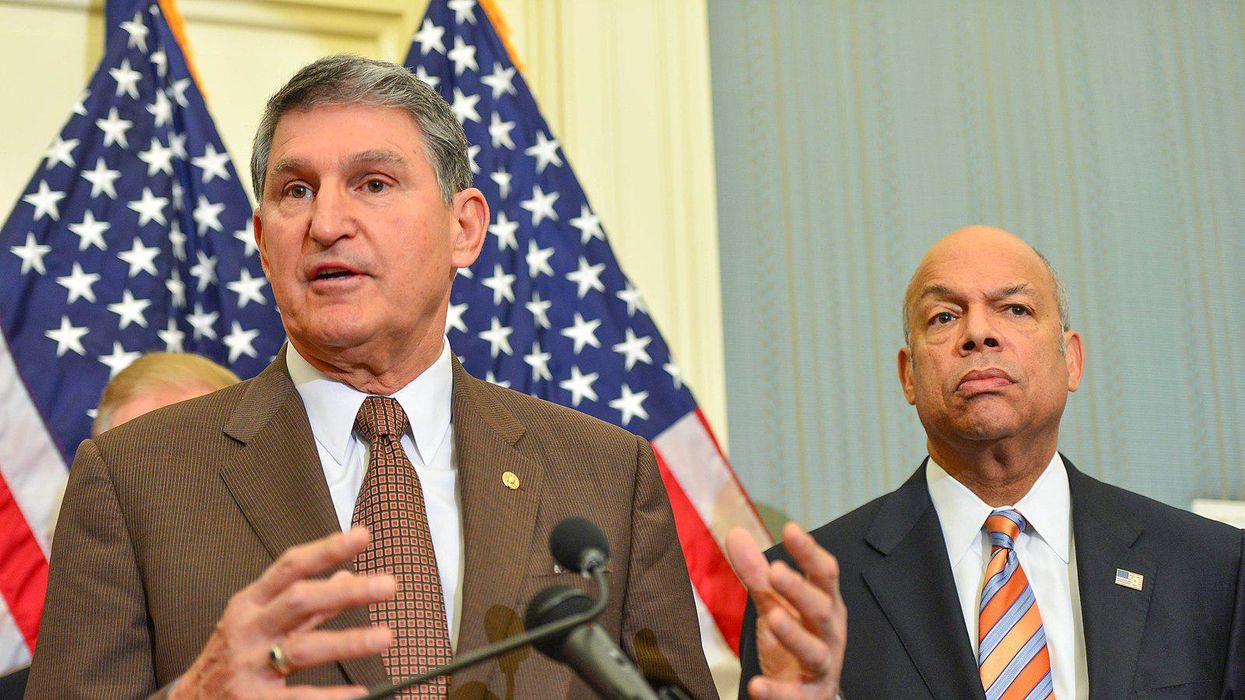New Study Shows Manchin’s ‘Bipartisan’ Approach On Voting Rights Is Misguided

Sen. Joe Manchin, left
Reprinted with permission from Daily Kos
When Sen. Joe Manchin of West Virginia shot down Democrats' signature voting rights legislation in an op-ed last week, he said that protecting voting rights "should never be done in a partisan manner."
But a new Brennan Center analysis of the voter suppression laws sweeping the nation shows what a preposterous and indeed hypocritical position that is. The center's examination of the 24 state-level voting restriction laws enacted as of early June proves the suppression efforts have been an almost exclusively Republican enterprise.
"Overall, we find that these new laws were enacted as part of an overwhelmingly partisan Republican push," reads the report. "Republicans introduced and drove virtually all of the bills that impose new voting restrictions, and the harshest new laws were passed with almost exclusively Republican votes and signed into law by Republican governors."
Still somehow Manchin insists that GOP lawmakers at the federal level are both interested in and fundamental to playing a corrective role to their counterparts in the states.
In Iowa, where one of this session's most restrictive bills passed on a party-line vote, Jennifer Konfrst, Democratic whip in the Iowa House of Representatives, is practically tearing out her hair over Manchin's intransigence.
"It is unfathomable to me that we would look at this issue and say we have to bring Republicans along, in this political climate, in order to make true change," Konfrst told The Atlantic's Ron Brownstein. "I don't see anywhere where Republicans are inviting Democrats along, or inviting Democrats to the table. Why are some Democrats saying 'I won't do this unless it's bipartisan?'"
Here's a snapshot of the Brennan Center findings courtesy of Brownstein:
- 14 states have passed 24 laws restricting voting access so far this year (with dozens still pending in another 18 states)
- 17 of those passed in nine states are deemed "highly restrictive" by the Brennan Center
- All nine of those states are under unified GOP control with the exception of Kansas, where Democratic Gov. Laura Kelly vetoed the law only to be overridden by the Republican-dominated state legislature
- No Democrat co-sponsored any of the 17 bills
- Not one Democrat voted for 13 of those 17 laws. Another three of those laws drew support from a single lonely Democratic lawmaker in the legislatures of Arkansas, Montana, and Wyoming. (The only highly restrictive bill to receive meaningful Democratic support was a voter ID law enacted in Arkansas)
- Among all the state House/Assembly Republicans who voted on these 17 bills, just 12of 1,143 voted against them; among state Senate Republicans, just seven of 458 voted no on them.
- Why Manchin Is So Wrong On Voting Rights - National Memo ›
- In West Virginia, Koch Network Pushes Manchin To Oppose Voting ... ›
- VIDEO: In Tulsa Remarks, Biden Takes Shot At Manchin And ... ›
- Sen. Manchin Says Filibusters Could Be Made More 'Painful ... ›
- There's A Better Way To Protect Democracy Than H.R. 1 - National ... ›
- In Leaked Tape, Manchin Says What He Really Thinks About Filibuster - National Memo ›
- Why Democrats Should Take Manchin’s Voting Rights Deal - National Memo ›
- What Manchin Knows — And What Progressives Could Learn - National Memo ›
- Manchin says he will vote against Democrats' voting rights bill ›
- The Democrats, Joe Manchin are walking into a voting rights trap. ›
- Manchin Unmoved On Voting Rights Bill Despite Civil Rights Groups ... ›
- Joe Manchin defends bucking voting rights bill and digs in against ... ›
- Joe Manchin opposes voting rights bill and defends filibuster in blow ... ›
- Is Joe Manchin's Voting Rights Campaign Serious? ›
- Joe Manchin's plan to protect voting rights, explained - Vox ›
- Manchin Vows to Block Democratic Voting Rights Bill and Preserve ... ›
- Joe Manchin: Why I'm voting against the For the People Act | Op-Ed ... ›








